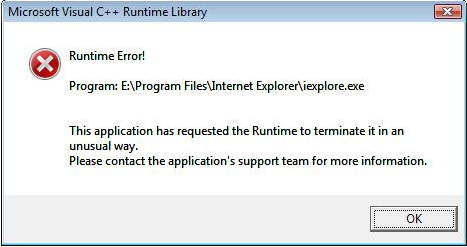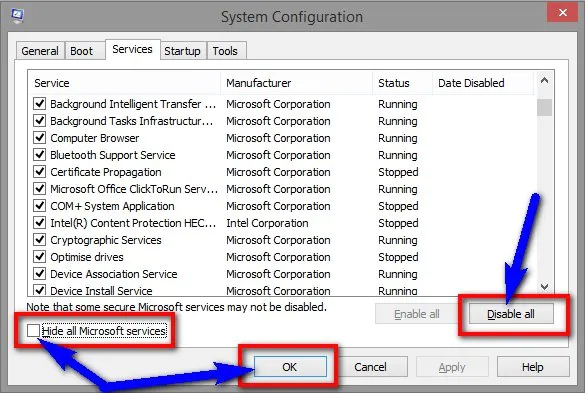Runtime error refers to the error that occurs while executing a program. Unlike compilation errors that occur during program compilation, runtime errors occur only during the execution of the program. Runtime errors indicate bugs in the program or problems that developers expected but were unable to fix. For example, insufficient memory can often trigger a runtime error.
Runtime errors usually appear in a message box that contains a specific error code as well as its description. It is quite common that the computer slows down significantly before the runtime error appears.
Runtime Errors :
- A runtime error in a program is an error that occurs after the program is successfully compiler.
- Runtime errors are commonly referred to as “bugs” and are often found during the debugging process before the software is release.
- When runtime errors occur after a program has been distributing to the public, developers often release patches, or small updates, designed to fix the errors.
- One can find the list of issues that they may face in this article.
- Many run-time errors can be encounter while solving problems on online platforms, which are not clearly specified in the message that accompanies them. There are several types of runtime errors which are logical errors, input–output errors, undefined object errors, division by zero errors, and more.
Related: what is client server runtime process
Explains Runtime Error
When a problem occurs and the software is unable to resolve it, it generates a runtime error. Here, the error is a production by that specific software and not by the OS. Through a self-assessment mechanism known as a trap, the software self-diagnoses and recognizes that it cannot proceed, leading to a runtime error. When a runtime error is displaying on and off, the associated software usually exits or freezes. In some cases, the OS is rebooted.
There are many reasons behind runtime errors. Some of them are as follows :
- The conflict between the Terminate and Stay Resident Program (TSR)
- Problems caused by running applications
- Memory issues
- Bad programming
- Other software problems
- Aging or damaged hardware
- Harmful or malicious applications such as computer viruses or adware
Why and when do runtime errors occur?
There are many reasons why users receive runtime errors on their computers. We’ll describe the most important reasons here :
- Memory leak.
- Programming errors.
- Incomplete installation.
- Corrupt registry.
- Memory Leaks
Memory leaks are the most common cause of runtime errors on Windows computers. It occurs when a program manages memory allocation incorrectly, such as consuming more RAM without freeing it. Memory leaks also occur when running code cannot access objects stored in memory.
- Programming Errors
Programming errors also cause runtime errors. When software is in the development stage, runtime errors can be found during the debugging process so that the developer can fix them before they are released. But if there is a bug in the software by mistake then it can cause a runtime error. In such a case, the runtime errors can only be resolved by downloading the update patch from the developer’s website.
- Incomplete Installation
Sometimes when a user is installing a program, the installer suddenly stops. There are many reasons for this interruption like power failure, system hang etc. This results in incomplete installation which may lead to runtime errors on the system.
- Corrupt Registry
A corrupted or damaged registry can cause the program to malfunction due to which you may get a runtime error. There are many reasons for the registry to be damaged. One of the main reasons is manual changes to the registry. Therefore, you must be careful while editing registry keys. It is always best practice to back up the registry before making any changes.
How to fix runtime error?
Runtime errors emerge in a variety of situations, so potential fixes are across the board. Follow the steps below and fix it :
- Restart the computer. This is a possible solution if your computer suddenly feels like it is running much slower than usual.
Some runtime errors are reason by memory-related issues, and restarting is the fastest way to shut down everything currently running on your PC. This will free up previously used system resources for the programs that are throwing the error.
- Update the program to its latest version. The runtime error can be reason by a bug that has not yet been patched in the release you are using.
For example, some users report a runtime error when they use the NVIDIA GeForce Experience to check for graphics card updates. In this scenario, you would update the NVIDIA program.
If there isn’t a built-in method to check for an update, you may need to re-download it from the software manufacturer’s site.
- Completely remove the program, and then reinstall it. An installation that does not finish completely properly can lead to a runtime error.
The update process in the previous step may have done this, but if you’re still getting the error, it’s time to confirm removing the program completely and reinstalling it from scratch.
- Install the latest Microsoft Visual C++ Redistributable Package. If your error says something about the runtime components of the Visual C++ library, this is a possible solution.
- Use SFC Scan to repair corrupt Windows files. The SFC command is executed in the Command Prompt window and can fix a runtime error.
- Run System Restore to restore your computer to its previous state. This can fix a runtime error if it is the reason for a corruption of the Windows Registry.
- Reinstall Windows. If focusing on a specific program doesn’t fix the runtime error, or if it’s interfering with the way Windows works overall, resetting is your last option.
How can programmers prevent runtime errors?
If you are a software maker, GeeksforGeeks suggests several ways to avoid runtime errors. Follow that link to go deeper into the different types of runtime errors, with examples of why they’re occurring and what you can do to prevent them. Some improvements include avoiding variables that are not initialized, and not declaring too much stack memory.



